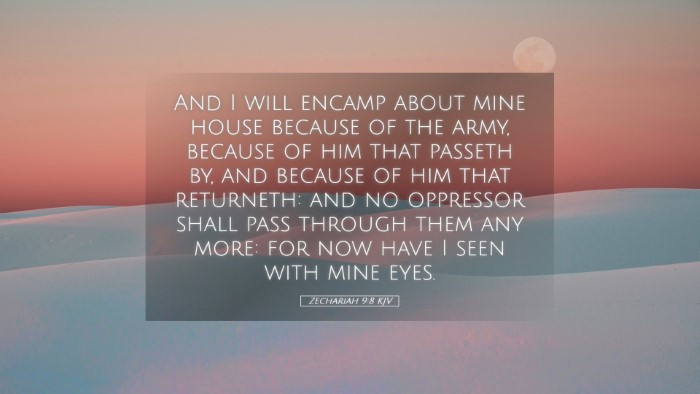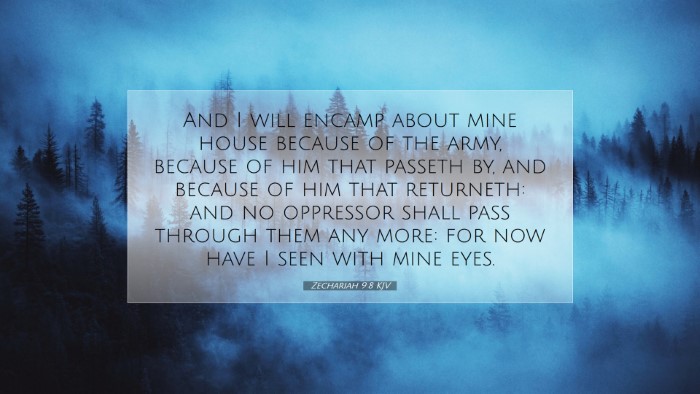Old Testament
Genesis Exodus Leviticus Numbers Deuteronomy Joshua Judges Ruth 1 Samuel 2 Samuel 1 Kings 2 Kings 1 Chronicles 2 Chronicles Ezra Nehemiah Esther Job Psalms Proverbs Ecclesiastes Song of Solomon Isaiah Jeremiah Lamentations Ezekiel Daniel Hosea Joel Amos Obadiah Jonah Micah Nahum Habakkuk Zephaniah Haggai Zechariah MalachiZechariah 9:8
Zechariah 9:8 KJV
And I will encamp about mine house because of the army, because of him that passeth by, and because of him that returneth: and no oppressor shall pass through them any more: for now have I seen with mine eyes.
Zechariah 9:8 Bible Commentary
Commentary on Zechariah 9:8
Zechariah 9:8: "And I will encamp about mine house because of the army, because of him that passeth by, and because of him that turneth again: and no oppressor shall pass through them any more: for now have I seen with mine eyes."
Introduction
The book of Zechariah is rich with prophetic visions and encouragement for the Jewish people in the post-exilic period. Zechariah 9:8 serves as a pivotal moment in understanding God’s commitment to protect His people against their adversaries. Various public domain commentaries provide insight into the wealth of meaning encapsulated in this single verse, showcasing the multifaceted themes of divine protection, military assurance, and restoration.
Textual Analysis
The verse can be divided into two main sections: God’s promise of protection and His observation of the state of His people. The assurance that God will "encamp about mine house" signifies His presence and guardianship over Jerusalem and its inhabitants. The reference to “the army” implies a recognition of the threats that Israel faced, while the phrase "no oppressor shall pass through them any more" indicates a future restoration of peace.
Commentary Insights
-
Matthew Henry’s Commentary
Matthew Henry emphasizes the protective nature of God's promise. He notes that God's encampment is not a passive stance but an active defense against those who might seek to harm His people. Henry elaborates on the implications of having God's eyes upon them, indicating His active surveillance and concern for their welfare. He interprets the "army" not merely as literal foes, but as any opposition that arises against God's purposes and people.
-
Albert Barnes's Notes
Albert Barnes highlights the contextual significance of this verse. He observes that the prophetic words serve as reassurance to the Israelites as they rebuild after exile. Barnes discusses how God’s promise to encamp about His house symbolizes a restoration of divine order and governance. He relates this promise to the ultimate fulfillment in Christ, who is the embodiment of God’s protection over His people.
-
Adam Clarke’s Commentary
Adam Clarke delves into the language used in this verse, reflecting on the metaphor of God as a warrior encamping around His people. He points out that this militaristic imagery reassures the Israelites of safety from both internal and external threats. Clarke also draws attention to the "passeth by" and "turneth again," suggesting a continual process of God’s vigilance—a reminder that He sees all that occurs, whether it be friend or foe.
Theological Implications
The broader theological implications of Zechariah 9:8 extend into themes of divine sovereignty and faithfulness. God’s commitment to intervene and protect illustrates His active role in the lives of His people. This notion connects with New Testament teachings that affirm God’s providence and the ultimate victory found in Christ.
Application for Pastors and Leaders
For pastors and church leaders, this verse serves as a profound reminder of God’s protective nature in times of uncertainty and challenge. It encourages a pastoral approach that emphasizes God’s presence in communal and individual hardships. Leaders can inspire congregants by conveying the assurance that God actively watches over them, providing solace during tumultuous times.
Conclusion
Zechariah 9:8 encapsulates the essence of hope rooted in divine protection and the promise of restoration. Through insights garnered from classic commentaries, it becomes clear that this verse not only speaks to the historical context of Israel but also has enduring relevance for modern believers today. The assurance that God encamps around His people resonates throughout Scripture, affirming the timeless truth of His unwavering presence and involvement in the lives of those who trust in Him.


